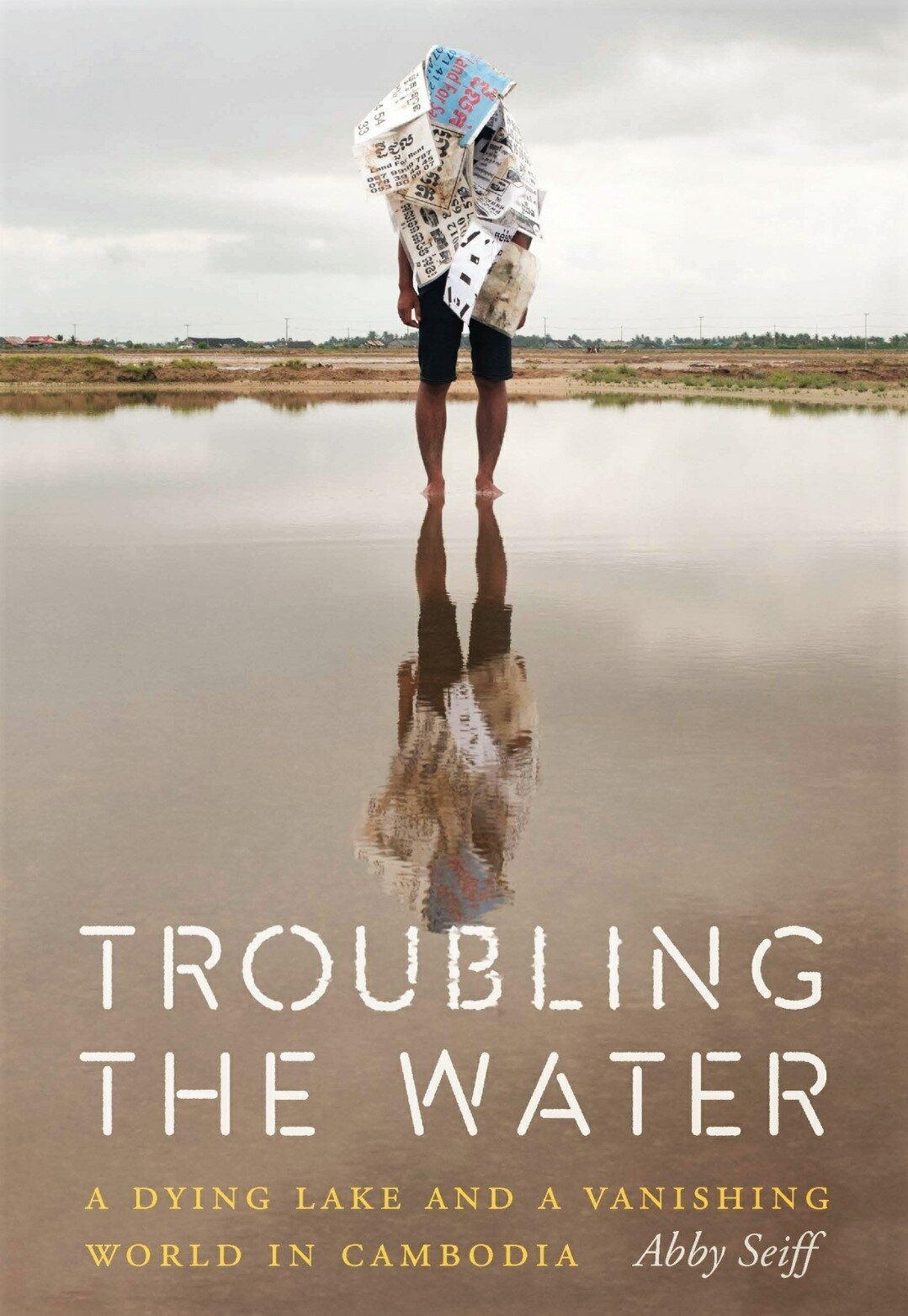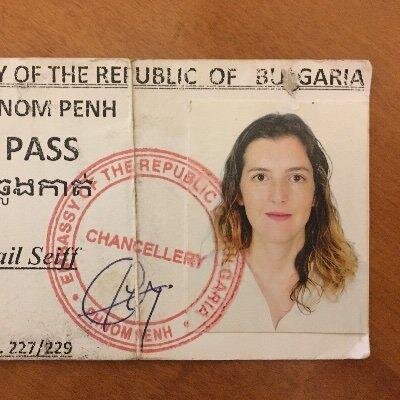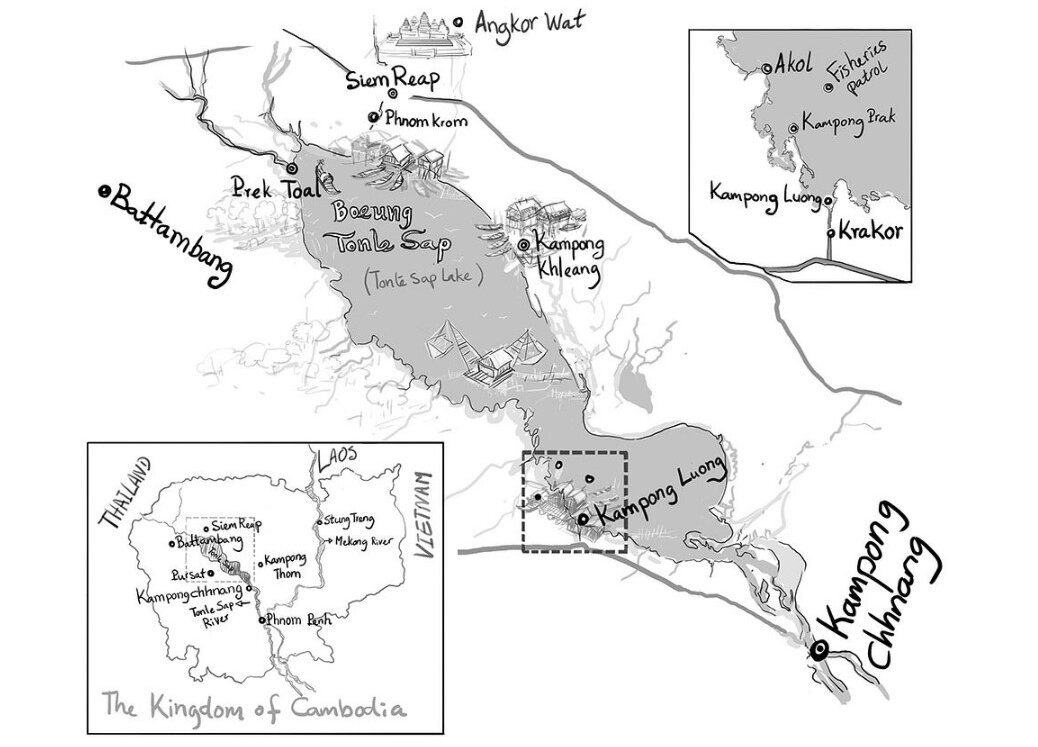Troubling the Water: a dying lake and a vanishing world in Cambodia
by Abby Seiff
A poignant -- albeit sometimes heavy on dystopia -- depiction of the ecological and human landscape of the "Great Lake" in the 2020s.

- Formats
- e-book, on-demand books
- Publisher
- Potomac Books, University of Nebraska Press, USA
- Published
- 2022
- Author
- Abby Seiff
- Pages
- 142
- ISBN
- 9781640125247
- Language
- English
The Tonle Sap Lake (ទន្លេសាប, literally “not salty nor sweet river”) the largest body of freshwater in the whole Southeast Asia region is shrinking, with ominous consequences for the entire Lower Mekong area subsistence in the not-so-long term, and for the communities on its shores in the short term: there is urgency, and a hint of despair in this concise, well-written essay mixing historical background, journalistic field reporting and the assumption that climate change and unsustainable human activities are spoiling what a French author from the 19th century called “the Mediterranean Sea of Cambodia”.
The very same factors that made the Great Lake such a fascinating biodiversity hotspot also contribute to its high vulnerability to climate change, droughts and the man-made disruptions of the Mekong River (and its tributaries) flow.
Cambodian artist Sao Sreymao’s map drawn for the book (reproduced here with her permission)
As early as 1993, the respect scientist (ichtyologist ) Tyson R. Reynolds warned: “It is time for a moratorium on construction of large hydroelectrical dams in Southeast Asia and for a moratorium on industries that release toxic wastes into rivers. Thailand’s most pressing development need is not further industrialization but restoration and protection of forests and rivers. The sooner this is recognized and acted upon the better” (‘Just another damned river? Negative Impacts of Pak Mun Dam on Fishes of the Mekong Basin’, NHBSS, 41: 105 – 133, 1993, p 131).
However, it is only now that regional powers-that-be seem to start grasping the seriousness of the situation. In March 2022, Cambodian Minister of Water Resources and Meteorology Lim Kean Hor requested that Mekong River water data be shared between riparian nations to accurately measure the impact of the river’s flow on the social and economic wellbeing of the region, while meeting with Anoulak Kittikhoun, the Mekong River Commission (MRC) CEO.
With her strong ecological commitment, the author of the present book gives a dire assessment of Tonle Sap Lake hydrographical situation, and of the disarray of fishing communities around the lake. A sense of looming disaster and of social desintegration of these communities is pervading these pages. One might object to this dystopian depiction that:
- blaming all ills on “corruption of the elites” and political choices (or lack-of) tends to overlook the geographical realities and cyclical trends that threaten all larges bodies of freshwater around the world. When the author nostalgically quotes 19th-century reports describing the pristine beauty of the lake, she sets aside hydrological findings from the same period indicating that the Great Lake will ultimately disappear (Edgar Boulangier, for instance, claimed that its remaining life span wouldn’t exceed two more centuries, even without negative impact from industrialization and higher demand in electricity).
- cold comfort can be found in the realization that even harsher environment-detrimental decisions have been avoided. For instance, some French officials still pursued in the 1960s, after Cambodia’s accession to independence, the outlandish idea of building a dam on the Tonle Sap River! (see D’AUBENTON, F., Report on the Operation of a Barrage on fhe Tonle Sap, Economic Commission for Asia and the Far East. Committee for Coordination of Investigations in the lower Mekong basin, 1963).
- the book doesn’t mention potential sources of income other than fishing (and overfishing), such as ecotourism. And distinct observers have recently described thriving communities on and around the Lake, with floating hospitals, schools and even volleyball fields. ‘Life on the water: A floating village on Lake Tonle Sap in Cambodia’ is the title of a more uplifting photo essay and report by Globetrottergirls, updated in March 2022.
Cover photo by NEAK Sophal.
Photo spread by Nicolas Axelrod.
The ebook version can be purchased online here..
Tags: Tonle Sap
About the Author

Abby Seiff
Abby Seiff is an editor and independent journalist with nearly a decade of international experience, primarily in Southeast Asia. Her writing has appeared in Newsweek, Time, the Associated Press, Al Jazeera, Pacific Standard, and more publications. She served as an editor for several years at The Cambodia Daily and The Phnom Penh Post, and has worked as an editor for Foreign Policy, Devex, New Humanitarian, and ChinaFile, among others.
A founder of Asia Society Magazine, Abby has developed and currently edits the Mekong Review Weekly, the Mekong Review newsletter.

